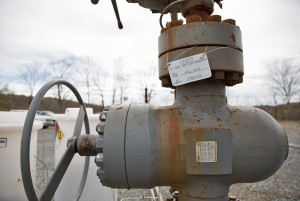PA lawmaker floats new severance tax proposal as industry pushes back
-
Susan Phillips

Lindsay Lazarski / WHYY
Cabot Oil & Gas operations in Susquehanna County include some of the most productive wells in the state.
State senator Jim Brewster plans to introduce a bill that would enact a 5 percent tax on Marcellus Shale gas production, and dedicate all of that revenue toward education. The western Pennsylvania lawmaker, from McKeesport, says the tax would generate between $700 million to $1 billion for public schools.
“My ‘Extraction for Education’ proposal is simple, reasonable and credible because it uses the proceeds of an extraction tax to support education,” Brewster said in a release posted today on his website. His plan would maintain the current impact fee, which helps fund local municipalities that bare the brunt of natural gas drilling. Brewster says gas producers would be able to claim a credit for the impact fee, while all of the proposed tax would get funneled to education.
But natural gas industry representatives in Pennsylvania say they are already paying their fair share of taxes. On a call with reporters today, Dave Spigelmyer with the Marcellus Shale Coalition said attempts by the incoming Wolf administration to raise $1 billion in revenue through a severance tax would “damage this play forever in the commonwealth.” Spigelmyer says the state should first get spending under control through pension reform, and have the shale gas boom generate tax revenue indirectly.
“There are opportunities for job growth, opportunities for a manufacturing renaissance,” said Spigelmyer. “All will create tax revenue for the commonwealth and I think that’s where the focus should be for the state.”
Spigelmyer says the industry won’t pack up and move, but it will invest less capital if a 5 percent severance tax eats into their bottom line. He says the lack of pipeline capacity has meant that Pennsylvania’s natural gas has fetched a lower price than other shale gas across the country because it’s more expensive to transport the gas to regions of high demand.
But an analysis by Platts last spring showed drillers would profit even with a 5 percent tax at current sale prices. The analysis showed producers continuing to make well above ten percent internal rate of returns, an industry benchmark. And although the number of new wells drilled has decreased, production has continued to increase. Just this week, driller Range Resources reported striking more gold in the Utica shale with a well that produced 59 million cubic feet of natural gas in just 24 hours.
















